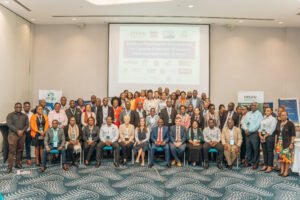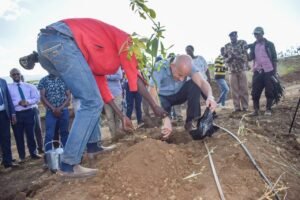By Zablon Oyugi August 28, 2024, Little or poor attention to aflatoxin menace in Kenya and the East Africa region is becoming a great concern among the food and feed industry experts attending a high-level discussion workshop in Nairobi on building the capacity of Food Business Operators (FBOs) to enable operators handle safety issues in the food and feed value chain.
According to the experts, the menace is increasingly affecting trade and posing health risks among grain consumers yet there seem to be little or lack of effort and mechanisms from stakeholders to curb it.
“This issue has been with us for a long time. We have discussed it but very little has changed after the deliberations meaning the proposals are left at the discussion tables with no implementation or proper communication on what is going on yet aflatoxin puts livelihoods and lives at risk,” said Mr. Julius Nyabicha, Cereal Growers Association.
The topic which started as one of the areas of concern from the first day of the workshop has been building up as it affects some of the staple grains consumed in the country and the region such as maize, and wheat. It also affects groundnuts which are used in some food products especially for children.
Professor Daniel Sila, Principal, College of Agriculture and Natural Resources at Jomo Kenyatta University of Agriculture and Technology (JKUAT) shade some light on the issue by presenting statistics on aflatoxin found in wheat and maize in the recent past.
“A research we conducted in 2020 and 2021 shows that while there has been up to 100 per cent improvement in aflatoxin management in wheat, maize has witnessed almost stagnating management leading to high detection of the fungi in the produce,” said Prof Sila.
According to the professor, the university has a fully-fledged food laboratory with cutting-edge equipment for food testing and assessing aflatoxin presence in grains.
This laboratory and the equipment has been of great relevance to both the private and public sector supplementing government efforts in testing food and feeds.
“We have donated some of these equipment to Nakuru, Mombasa, Kisumu and Nairobi County governments to enhance surveillance and testing for aflatoxin and we hope this will bring the desired difference going forward,” he said.
Lack of Proper Communication Strategy
Experts have highlighted the absence of an effective communication strategy by governments as a significant challenge in aflatoxin handling and management. This shortcoming creates a substantial information gap within the agricultural sector.
“Without a clear and coherent communication framework, crucial information on aflatoxin risks, prevention, detection, and management does not reach farmers, producers, processors, and other stakeholders in a timely or effective manner.”
As highlighted, the lack of a proper communication strategy affects several critical areas in aflatoxin management. It limits awareness and education, leaving farmers and stakeholders uninformed about the dangers of contamination and safe handling practices, which compromises food safety.
It also hampers coordination among agencies, organizations, and industry players, leading to fragmented efforts and preventing a unified response.
Overall, without a well-defined and executed communication strategy, the potential for addressing aflatoxin risks effectively is significantly diminished, leaving the industry vulnerable to ongoing and perhaps escalating issues.
It follows therefore that developing such a strategy is crucial for creating a more informed, coordinated, and responsive approach to aflatoxin management in the agricultural sector.







